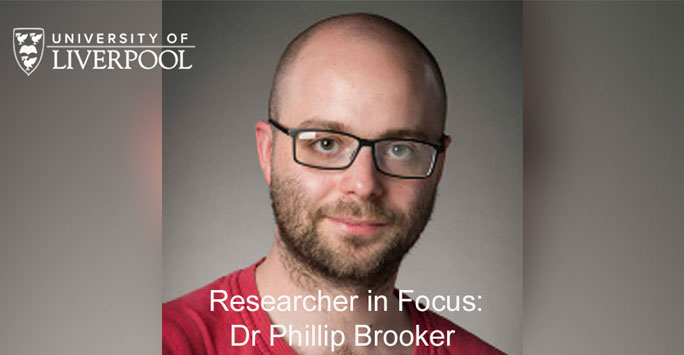
Meet this month’s Researcher in Focus, Dr Phillip Brooker. Phillip’s wide-ranging research includes human/computer interaction, the philosophy of science and Science and Technology Studies.
Phillip Brooker is a Lecturer in Sociology, having joined the department of Sociology, Social Policy and Criminology in September 2017. Phillip's broad research areas incorporate ethnomethodology and conversation analysis, Science and Technology Studies, the philosophy and sociology of science/knowledge, human-computer interaction, computer-supported cooperative work, the philosophy of mind, ordinary language philosophy, digital methods, social media analytics, and Programming-as-Social-Science (PaSS).
Phillip is also the Digital/AI (artificial intelligence) research theme lead for the Faculty of Humanities and Social Sciences' Centre for Digital Humanities and Social Sciences.
Since completing his PhD in 2013 - a video-aided ethnography of the use of computer programming languages in scientific research - Phillip's postdoctoral work shifted focus to the emerging fields of social media analytics and digital methods. This work saw him both assisting in the development of methodological tools to support research in these areas (e.g. Chorus, a Twitter data collection and visual analytic suite - see chorusanalytics.co.uk for further details), as well as applying those tools to undertake empirical studies of intersections of social media with social issues (e.g. poverty and welfare, obesity stigma, healthcare and racism).
More recently, Phillip has been bringing together the different strands of his work to explore the potential for computer programming languages, particularly Python, to feature in the core research methods training of the social sciences.
To this end, Phillip has been instrumental in designing and developing a variety of resources and training for students and researchers seeking to study the digital world and the data it generates (e.g. social media).
Phillip has recently designed and delivered (in collaboration with Mark Carrigan and funded by the National Centre for Research Methods) the inaugural "Programming with Python for Social Science" bootcamp - a four-day residential course designed to train a selected cohort of Early Career Researchers and Postdoctoral Researchers in the use of Python as an innovative method and toolkit for addressing social science research questions. The bootcamp has already bloomed into a network of early-adopters of Programming-as-Social-Science (PaSS) who can collaborate to shape and (re)define social research going forward (see the @ProgSocSci Twitter account for details and updates).
Relatedly, Phillip is also publishing in this area, with the aim of taking an instrumental and central role in the development of this new field of enquiry as it emerges (e.g. Phillip's forthcoming book "Programming with Python for Social Scientists", and his paper for The Sociological Review called "My Unexpectedly Militant Bots: A Case for Programming-as-Social-Science").
Phillip has also started up a project exploring how knowledge of "Living and Working in Space" is construed from the scientific experimentation that took place on-board NASA's Skylab - the first space station (i.e. spacecraft capable of supporting a human crew in orbit for an extended period of time), which was operated by three human crews between May 1973 and February 1974. This project involves a close analysis of documentary reports produced by Skylab - chiefly communications transcripts, technical reports, experimental results, and NASA's "Man-Systems Integration Standards 3000" and "Spaceflight Human-System Standard" reports on designing habitable environments for humans in space. Though this project is in the earliest stages of a work-in-progress, Phillip is also disseminating this work as it unfolds in the form of a podcast (listen here).